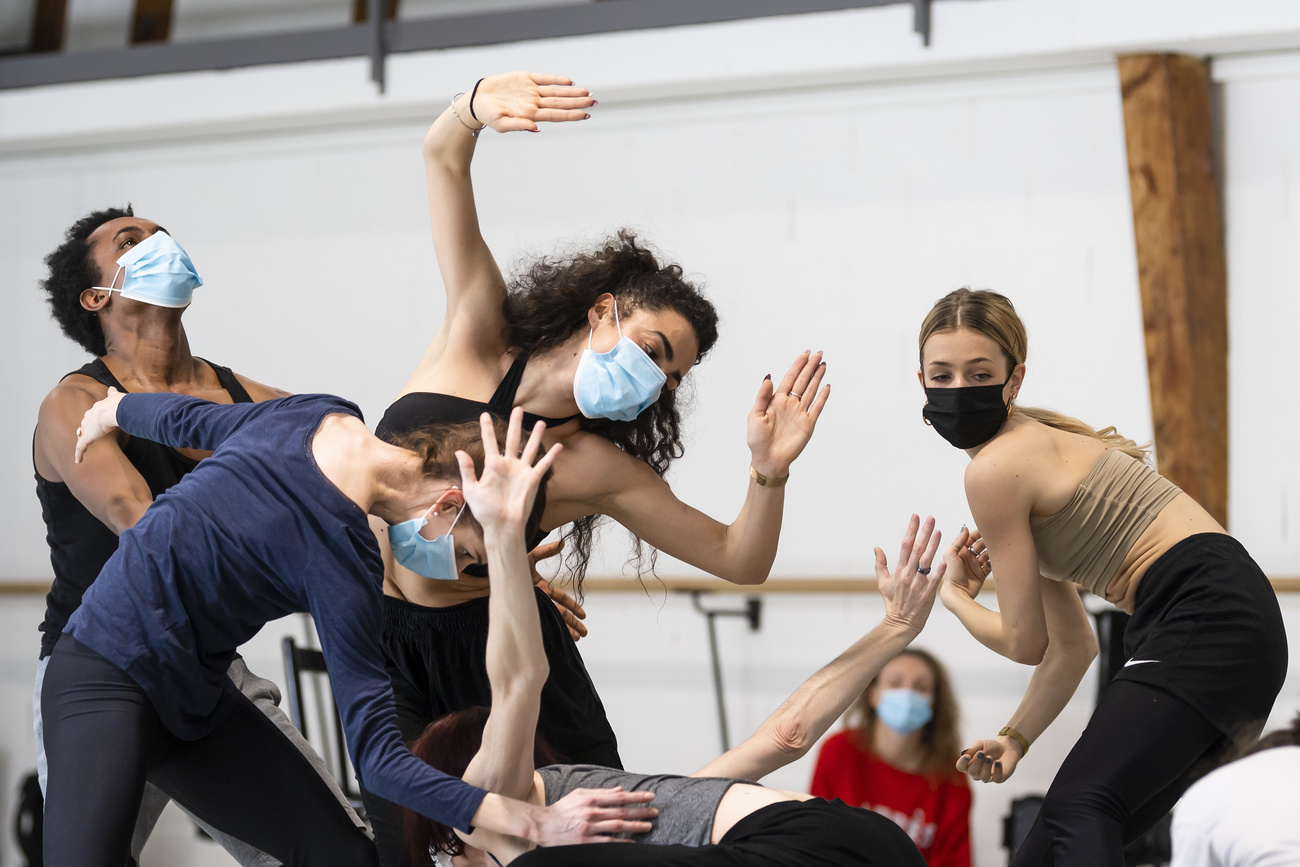
Breaking the code of silence on abuse in dance

This year three Swiss dance companies, including the Béjart Ballet Lausanne, found themselves in hot water for claims of psychological abuse and sexual harassment – problems that affect not just Switzerland.
Since the #MeToo movement was re-ignited in the United States in 2017, several cases of abuse allegations have erupted in the arts and culture sector in Europe.
Scandals came to light in France, notably through the publication of books such as Le Consentement (Consent, published in January 2020) by Vanessa Springora, an editor, abused at the age of 14 by a writer. AccusationsExternal link against the internationally renowned choreographer Jan Fabre have shaken up the arts scene in Belgium. In Switzerland, a reckoning has begun in the dance world.
Last summer the Béjart Ballet Lausanne (BBL) and its artistic director Gil Roman were placed under audit after allegations of psychological abuse emerged. But the BBL was only the most high-profile case to come to light.
“A breeding ground for predators”
Months earlier an investigation by the newspaper Le NouvellisteclaimedExternal link that the founder of dance company Interface in canton Valais had a “psychological hold” on performers, who were victims of manipulation and sexual abuse. More recently the newspaper Le Temps published testimoniesExternal link by dancers who said they were sexually harassed by the founder and director of the Geneva-based contemporary dance company Alias.
Anne Davier, who runs the Pavillon ADCExternal link (Association for Contemporary Dance) in Geneva, says that sexual abuse occurs in all sectors of work. But if dance is on the front line, she adds, “it is because in this profession the body is the main tool of work – work that is often carried out in physical proximity [to others].”
“Sometimes nudity is also part of the project,” she says. “There is this preconceived notion that artists will never think of stage directions as abuse, but rather purely as a means of advancing artistic expression.” All these elements “can blur the boundaries and create a breeding ground for sexual predators,” she adds.
Although allegations of abuse have emerged in the French-speaking region, the problem is likely more widespread, according to Davier.
“In German-speaking Switzerland no cases have been revealed in the dance world, but that doesn’t mean they don’t exist,” she says. French-speaking media outlets have been particularly active in reporting claims made by dancers.
Support, advice and prevention
In response to the allegations, the performing arts trade union in French-speaking Switzerland, SSRS, set up a resource unitExternal link – the first of its kind in the country – “to offer neutral and benevolent support” in cases of workplace harassment. Staffed by doctors, lawyers and psychologists, the unit is open to all cultural workers in the region. The unit focuses on prevention and advice to victims on possible courses of action.
Although a law forbidding harassment in the workplaceExternal link exists, it is not always respected, says Anne Papilloud, secretary-general of the SSRS.
“Its existence is often not enough, but our unit makes it possible to activate the protection measures provided by the law,” she explains. Five cases have been reported to the unit since it opened on November 1.
“Confidentiality remains absolute here.”
Cases with resonance
According to Papilloud, many artists do not speak out for fear of possible repercussions.
“At Alias, some of the dancers did not report harassment because they wanted to avoid finding themselves in a situation that would have hurt their careers,” she says.
The dance world normally attracts less attention that the sports or film sector, for example, but the cases in Switzerland have resonated.
“I think it’s the notoriety of the person [involved] that creates the [media] glare,” says Papilloud. “The abuse is still scandalous, no matter who commits it.”
When the scandal at the world-renowned Béjart Ballet broke, Papilloud received press stories about the allegations from all over the world.
“Switzerland is by no means an isolated case” in terms of abuse in the performing arts, says Anouk Van den Bussche, head of communications at the International Federation of ActorsExternal link (FIA). The Brussels-based organisation has several members worldwide, including the SSRS.
“We share a lot of strategic information with our members to better fight against harassment and bullying,” she says. “The Béjart Ballet affair has had a major impact, particularly in the French-speaking world. You can see this from the outcry, especially in the press.”

Fabre, from Antwerp, was accused of harassment earlier this year, triggering a protest movement within the Belgian arts community. A trilingual electronic platform was subsequently created for victims to submit their testimonies.
Some countries are going further in addressing the problem, adopting new measures to discourage predators. Sweden, for example, offers anti-harassment training to its choreographers, directors and filmmakers, according to Van den Bussche. “Artists who refuse this training cannot get grants for their projects,” she says.
In Switzerland, similar measures do not yet exist at the national level, according to Anne Papilloud.
Adapted from French by Adam Szreter/gw

In compliance with the JTI standards
More: SWI swissinfo.ch certified by the Journalism Trust Initiative

























You can find an overview of ongoing debates with our journalists here . Please join us!
If you want to start a conversation about a topic raised in this article or want to report factual errors, email us at english@swissinfo.ch.